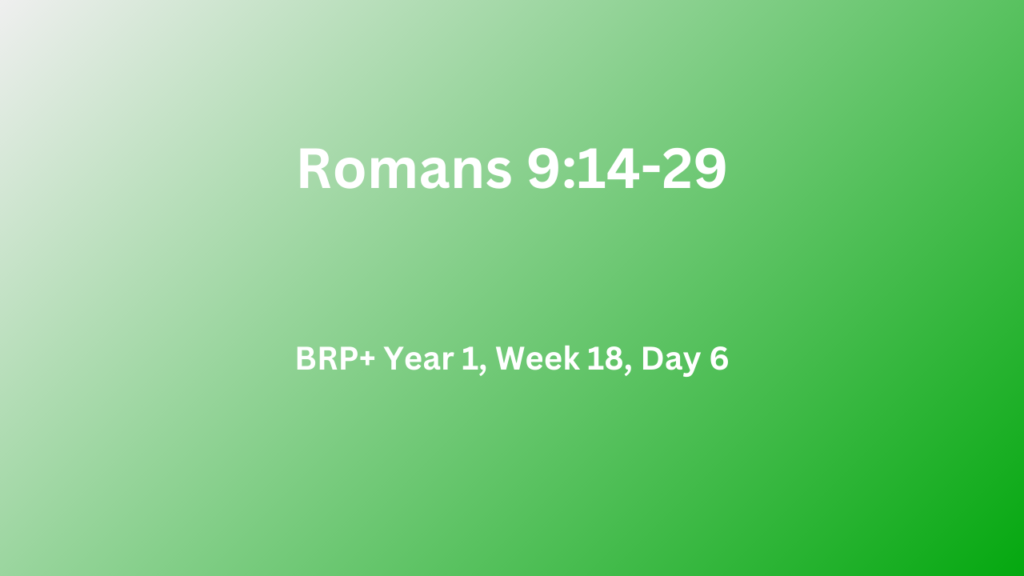Romans 9:14-29
Q.1. Do people have the final say in who is shown mercy? Why did God raise up Pharaoh? How can Paul state there is no injustice with God? – (Rom.9:14-18)
How could Paul claim that there is no injustice with God, after referring to God’s choice of Jacob over Esau? (see Rom.9:10-14). Romans is the most methodical and comprehensive explanation of the gospel of Jesus Christ. To understand Paul’s statement, we must return to his arguments in the earlier chapters of the book. In chapter one, he declared that – the wrath of God is revealed from heaven against all ungodliness and unrighteousness of men who suppress the truth in unrighteousness, because that which is known about God is evident within them; for God made it evident to them (Rom.1:18-19). In other words, though it is obvious that we need a Saviour, people deliberately reject God’s provision through Christ. Paul also declared that all sinners stand guilty before a holy God (see Rom.3:19-20). Yet God could not have done more, in order to redeem us through Christ’s substitutionary death on the cross (see Rom.3:21-26). For God to save a single person, it has to be an act of amazing compassion, since we are all dead in our trespasses and sins (see Eph.2:1, 4-7; Col.2:13-14). In fact, it would be unjust for God to exempt any sinner, if He had not found a just basis by which to save those who place their faith in His Son (see Rom.3:26). Moreover, we could have done nothing to save ourselves if God had not found a way to save us. Therefore, it is God’s doing, and not our own – 16 So then it does not depend on the man who wills or the man who runs, but on God who has mercy. 17 For the Scripture says to Pharaoh, “For this very purpose I raised you up, to demonstrate My power in you, and that My name might be proclaimed throughout the whole earth.” 18 So then He has mercy on whom He desires, and He hardens whom He desires (Rom.9:16-18 c.f. 1 Cor.1:29-30). Pharaoh’s refusal to acknowledge God, only magnified God’s compassion, and mercy towards penitent sinners.
Q.2. Why do people find fault with God? What makes such a claim unacceptable? Does God’s wrath have a just basis? What does His mercy reveal? – (Rom.9:19-23)
People may argue – … Why does He still find fault? For who resists His will? (Rom.9:19). However, for as long as people are still living, they may surrender to Christ, as the thief did on the cross at the last hour (see Lk.23:40-43). Paul then exposed such objections, with the illustration of the potter and the clay (see Rom.9:20-21 c.f. Isa.29:16; 45:9; Jer.18:1-4). We all, without exception, are objects of His wrath because – all of us as sheep have gone astray and each of us has turned to his own way (Isa.53:6). So – 22 What if God, although willing to demonstrate His wrath and to make His power known, endured with much patience vessels of wrath prepared for destruction? 23 And He did so to make known the riches of His glory upon vessels of mercy, which He prepared beforehand for glory (Rom.9:22-23). That God extends His mercy to any rebel sinner at all, is a demonstration of His grace and goodness.
Q.3. Does God show any racial bias in His choice? Why was Israel in danger of being wiped out like Sodom and Gomorrah? Whom does God choose? – (Rom.9:24-29)
Israel was God’s chosen people. They saw themselves as superior to the other races (see Rom.2:17-24). However, God did not choose Israel because they deserved it. They were chosen for a purpose (see Dt.7:7-8). Moreover, God’s choice went beyond Israel and also included all those whom He called from among the Gentiles – “And it shall be that in the place where it was said to them, `you are not My people,’ There they shall be called sons of the living God.” (Rom.9:26 c.f. Rom.9:24-25). There is no racial favouritism. God had spoken to the nation through Moses, when He promised blessings for obedience, and also laid down the framework of His curses for unfaithfulness (see Deut.chpts.27-28). Their constant breaking of the covenant brought chastisement, and eventual exile from the Promised Land. Paul reminded them that they would have been destroyed like Sodom and Gomorrah, had God not promised to restore a remnant of Israel (see Zech.13:1, 7-9; Rom.9:27-29). However, God’s mercy is extended only to those who place their faith in the Son of God (see Jn.3:16-18, 36).
NOTE: It is dangerous to take the truth of the gospel out of context. Paul placed his teachings on God’s sovereign choice and the promise of salvation to all who call on the name of the Lord in the succeeding chapters of Romans 9 & 10. Any interpretation that devalues the truth contained in these chapters is drifting from the gospel into empty philosophy – Remind them of these things and solemnly charge them in the presence of God not to quarrel about words, which is useless and leads to the ruin of the hearers. Be diligent to present yourself approved by God as a workman who does not need to be ashamed, accurately handling the word of truth (2 Tim.2:14-15)

